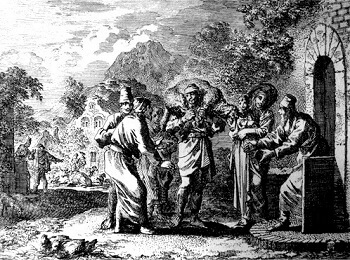 Saint Paul wrote in today’s first reading today that:
Saint Paul wrote in today’s first reading today that:
“We who worship through the Spirit of God, who boast in Christ Jesus and do not put our confidence in flesh, although I myself have grounds for confidence even in the flesh.”
Then, he wrote:
“In observance of the law a Pharisee, in zeal I persecuted the Church, in righteousness based on the law I was blameless.”
Doesn’t that sound like our own self-righteous behavior sometimes? We know the rules and get upset with people who do not follow them. Another modern term for this kind of attitude is that we are ‘set in our ways’, which is a rigid, inflexible attitude. We think that by carefully following the rules, it will make us a good person. We go to Mass every week and confession on a regular basis. We obey the traffic laws, watch our speech, have good manners, wait our turn in line, etc.
Most of us obey the ten commandments. In fact, the ten commandments are a sure guide for confession, if you do not have a guide for reconciliation handy. Guides to confession help us to clearly identify any sins we have committed, or infractions of the rules we have broken. It can become like a checklist that we review, when it is time to confess our sins.
If we so clearly understand the line between what is right and what is wrong, then why don’t other people?
The same thing applies to our Catholic beliefs too. Everyone knows what the church teaches and yet some people have the audacity to have a different point of view. If we do not believe in something though, we will fall for anything. That is what happens to society when the ‘rules’ are taken away. Relativism sets in, and truth becomes whatever we personally perceive it to be.
This kind of thinking can become flawed though, if we adhere to our beliefs so rigidly that there is no room for genuine love to flourish. It can even be very damaging to marriages, relationships with our children, or with our friends. There is a greater law than even the laws that we know to be good and that is the law of love.
The law of love doesn’t mean to reject the rules, or that the rules are arbitrary, but rather do we remain open to love? Sometimes things can develop so badly that the rules must simply be set aside for the moment, in order to address a much larger problem at hand. Saint Francis said the church is like a field hospital. When you are operating on life threatening wounds, it is not the right opportunity to discuss your cholesterol levels. He has a point!
This brings us to today’s gospel. Jesus tells two parables about seeking out the lost, the parable of the lost sheep, and the parable of the lost coin. Sometimes we can actually be the one who is lost, even when we think we are doing everything right (like Saint Paul did when he persecuted the new Christians). The rules can become so important to us, that we actually do harm to those who do not believe the same way we do (at the moment). Heated arguments ensue. That is why we have something called Apologetics in our church, in an attempt to help Catholics discuss and defend our faith without arguing, and by showing respect for those who differ with our beliefs.
The reason that the shepherd rejoiced when he found his lost sheep, and the woman rejoiced when she found her lost coin, is because they regained something that was valuable to them. We are like that to God. Our souls are the most precious thing in the universe to Him. He loves us much more than we love our own family members and friends. It hurts Him when we stray from love. On the surface it may seem like everything is humming along smoothly in our life. We’ve got everything under control. But deep inside our hearts are a different matter. If we do not love first and foremost, then we have strayed from God and strayed from the essence of Christianity.
One last thing worth noting about today’s gospel, is that the shepherd and the woman in the parables both called their friends and neighbors to come celebrate with them, on finding what they had lost. Love is a communal thing. Our actions affect the entire Body of Christ. When one of us gravely sins, it affects the entire church, as was the case with the priests convicted of the sexual abuse of minors. It affected the whole church. The opposite is also true though. When one of us grows in holiness, this also affects the entire church. Remember Mother Theresa? Saint Paul II? Their holiness affected the church throughout the world, but also many others outside of our church as well.
A thought for the day might be to remember this. That our actions are not neutral. We either build up one another, and the entire church in the process, or we tear others down like Saint Paul did in the first reading for Mass today. Our little actions matter. In the long run, these small everyday actions build up into something beautiful for the Lord Jesus, or not.
Daily Mass Readings:
Phil 3: 3-8a / Ps 105 / Lk 15: 1-10
